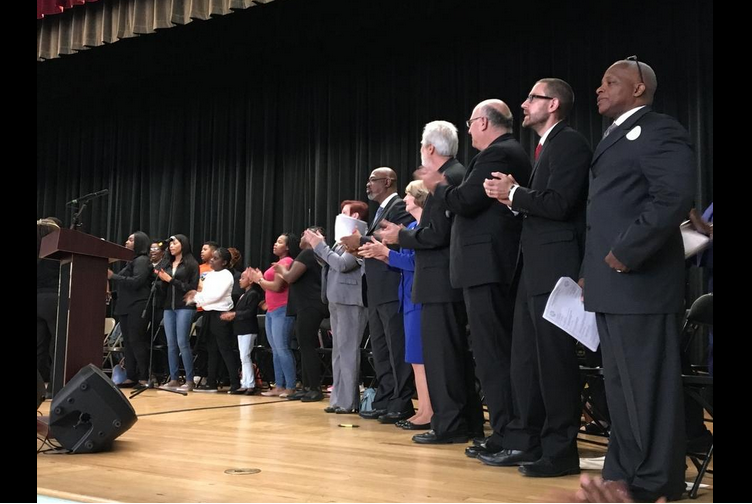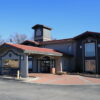March 24, 2018. Herald-Tribune.
SURE’s annual Nehemiah Action Assembly is a model for advancing community justice
Though my heritage on my father’s side is Jewish, and on my mother’s Episcopalian, I wasn’t raised in either faith. In fact, the extent of my early religious training was attending Sunday school at the only church that existed in our rural village while my parents returned home for a gratefully quiet morning without children.
Over the years, I’ve studied many spiritual traditions and absorbed aspects of a few. But it wasn’t until I walked into the Sarasota Municipal Auditorium last week for the Nehemiah Action Assembly of SURE (Sarasota United for Responsibility and Equity) that I felt ready to convert.
For those who are unaware, SURE (suresarsaota.org) is a network of 19 local congregations working together to bring positive change to Sarasota. Its annual assembly — named for the central figure in the Book of Nehemiah, who transformed anger into action to rebuild Jerusalem — is designed to hold local officials’ feet to the fire on targeted issues critical to our community’s justice, equity and inclusivity.
Since its founding in 1998, when clergy recognized the need to unite and form a powerful voice for change in Sarasota, the nonprofit has, among other things: championed the effort to get a jail diversion program for homeless individuals with mental illnesses; helped extend bus service to Longboat Key to accommodate residents dependent on public transportation for work; worked to implement a substance abuse and rehab program in the county jail; and secured a commitment to civil citations rather than arrest for juveniles with low-level offenses.
At the top of this year’s agenda were two items: to eliminate out-of-school suspensions at the elementary, middle and high school levels; and to encourage the creation of a trust fund to incentivize the development of more affordable housing. The handful of local school, city and county officials in attendance had been prepped in advance on what to expect so there would be no “ambush.”
The Rev. Wayne Farrell of St. Boniface Episcopal laid down the SURE ground rules, a most admirable approach to discourse. Officials would be asked to respond to questions with a simple no or yes — a yes rewarded with a two-minute opportunity for expansion. (I don’t know if it’s true, but I’m told City Manager Tom Barwin once copped out with a “Yo.”) The 1,000-plus residents in the audience were encouraged to cheer positive responses, but cautioned to refrain from “hissing, booing or other auditory negativity.” The suggested alternative was “deafening silence.”
“Tonight, we want to show our unity,” said Farrell. “We are here for real solutions, real actions. We call upon our elected officials to move our community toward justice.”
Sarasota County Schools Superintendent Todd Bowden got cheers for his “Yes, sir” to a couple initial softballs, the first of which asked him to visit Jacksonville schools, where “restorative strategies” that encourage students to take responsibility for the actions and change their behaviors have been implemented as an alternative to suspensions. The second asked him to push for quarterly data collection of any restorative strategies implemented.
Before his third question, Bowden was reminded of a previously-stated goal of cutting last year’s 2,200 out-of-school suspensions by half. (At 1,700, the district is currently on track to exceed that number this year.) Then he was asked to deliver a full implementation plan (adding middle and high school programs to the already existing elementary plan) by May 24.
“No,” Bowden responded. “I cannot.”
The audience remained tensely silent as SURE members briefly caucused and came up with a slight modification to the query. If Bowden was pleased by what he saw in Jacksonville, would he commit to working on a full implementation plan?
“If that is true, then yes, sure,” he replied.
“I’ll take that as a ‘yes,’” said Rev. Wes Bixby of the First Congregational UUC to cheers from the audience.
Before moving on to the affording housing requests, Barbara Chase, a near 40-year resident of Sarasota, shared her story of living for a time in her car with her late husband — a professional drywaller “who helped build this beautiful city” — after he lost his job during the recession. They couldn’t afford anything else.
County Commissioners Paul Caragiulo and Alan Maio both readily agreed that Sarasota’s affordable housing crisis deserves a committed response from the County Commission. They noted they’d already helped advance zoning changes that will make building affordable units more enticing to developers.
But when it came to a request to propose a “Housing Opportunity Fund” with a dedicated revenue source that would target households making less than $37,000 a year (the area median income), both reluctantly said they didn’t have the power to commit.
“No,” said Maio, “But I would ask the county administrator to look into how this would work in Sarasota County.”
“I am in support,” said Caragiulo, “but I don’t say yes unless I can absolutely deliver it. This is what I can commit to: I will look for every way possible, feasible, to create a fund that’s effective.”
That counted as a yes too.
“It’s been a pleasure to deal with people who are serious about an issue, not just in words, but in deed,” Caragiulo added. I couldn’t agree more.
As the assembly moved toward its conclusion, the Rev. Keturah Pittman of Greater Hurst Chapel reminded everyone that there was much work yet to be done.
“After the vigil comes vigilance,” she said. “As Frederick Douglass once said … ‘I received no answer until I prayed with my legs.’”
Diverse community members united for the benefit of all. Substantive issues moved forward cooperatively and efficiently. Educated voices engaging in respectful civil discourse. Plus some bodacious singing by the Greater Hurst Chapel choir and a punctual adjournment that had me home by 8:30 on a worknight.
Now that’s my kind of religion.
View original article.






